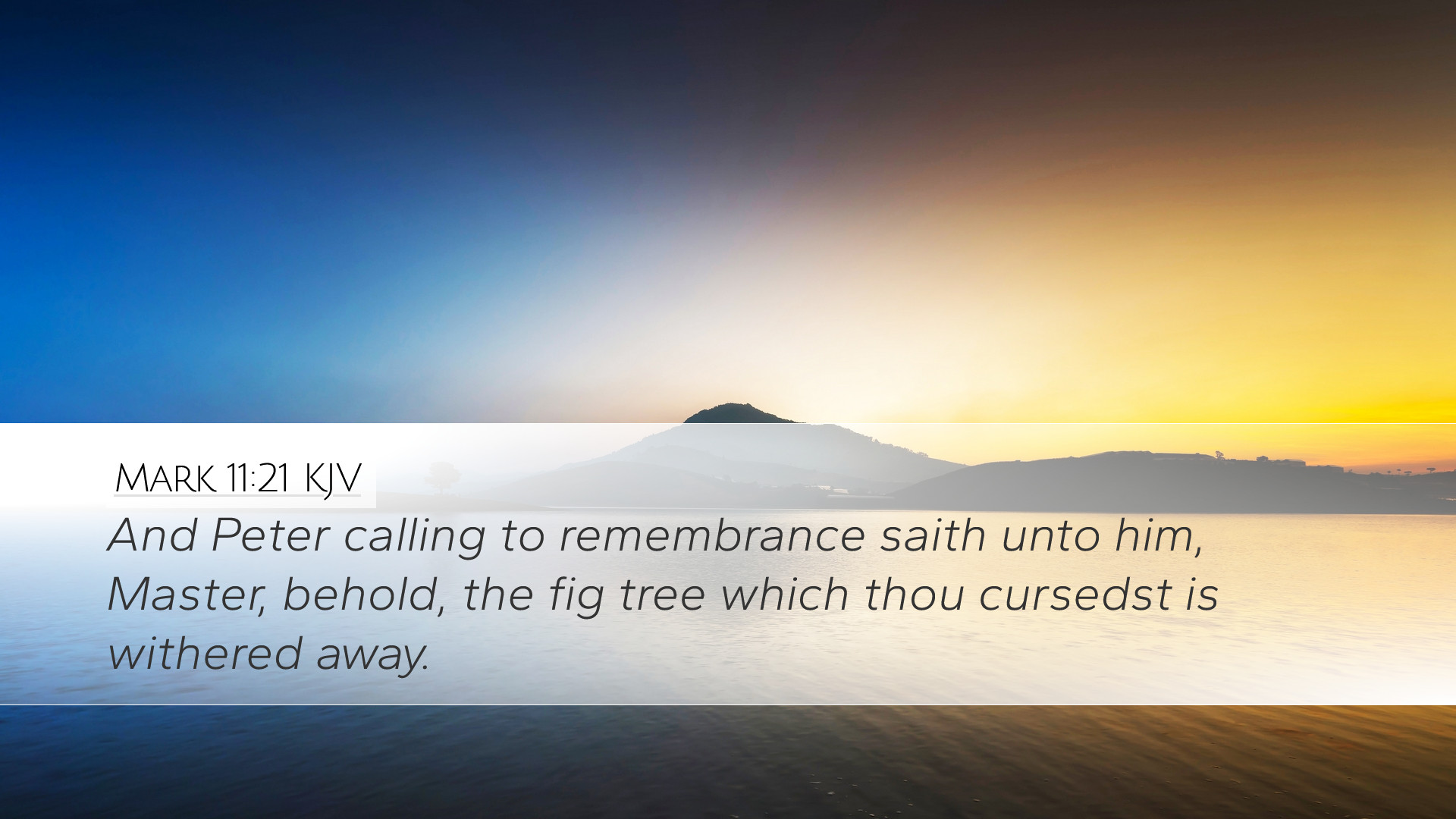Commentary on Mark 11:21
Verse Text: "And Peter, remembering, said to Him, 'Rabbi, look! The fig tree which You cursed has withered away.'
Introduction
This passage is rich in theological significance and teaches valuable lessons about faith, divine judgment, and the power of words. The event surrounding the cursing of the fig tree is pivotal in establishing the authority of Jesus and exemplifying the nature of true faith.
Contextual Analysis
Mark 11 recounts a series of events during the last week of Jesus' earthly ministry, focusing on His triumphal entry into Jerusalem and subsequent teachings. The cursing of the fig tree serves as a symbol of the judgment on the religious leaders and nation of Israel who were unfruitful, failing to recognize the coming Messiah.
Matthew Henry's Commentary
Matthew Henry emphasizes the significance of the fig tree as a representation of Israel's spiritual barrenness. He notes that Jesus, upon seeing the fig tree with leaves but no fruit, cursed it as a demonstration of God's judgment upon those who appear to have life yet produce no spiritual fruit. Henry writes, "The fig tree, though it had leaves, was without fruit; so was the profession of the Jewish people, fair in outward appearance but void of inward grace and real goodness."
Albert Barnes' Insights
Albert Barnes expounds on the symbolism of the fig tree in connection to faith and prayer. He notes that the withering of the fig tree exemplifies the consequences of a lack of fruitfulness and the severity of divine judgment. Barnes writes, "This event serves to serve a double purpose; it is a lesson both of faith and a warning against the consequences of hypocrisy in religious life. The tree's failure to produce indicates the judgment of God on the temple and religious leaders for their lack of spiritual fruit."
Adam Clarke's Perspective
Adam Clarke elaborates on the broader implications of this event. He discusses the significance of remembering in Peter's declaration, stating that it serves to remind readers of the urgency of Jesus' message concerning faith and accountability. Clarke observes, "Peter's exclamation reminds the disciples that even the most seemingly mundane issues can carry great spiritual weight and emphasize the necessity for faith in the power of Jesus' words."
Theological Themes
- Faith and Prayer: The cursing of the fig tree leads into a discourse on the power of faith. Jesus later teaches that with faith, even mountains can be moved (Mark 11:22-24).
- Judgment and Accountability: The fig tree's demise serves as an allegory for the coming judgment on those who fail to respond to God's call. This theme resonates throughout scripture, as God calls His people to be fruitful.
- Symbol of Israel: The fig tree is a direct reflection of Israel's spiritual condition. Just as the tree lacked fruit, so too had the temple system become ineffective and hollow.
Practical Application
For pastors and theologians, this passage encourages introspection concerning one's spiritual productivity and the need for authentic faith in ministry. Just as Jesus cursed the fig tree for its unfruitfulness, modern-day believers are called to examine their own lives for signs of spiritual fruit.
Reflection Questions:
- What areas of my life may be lacking in spiritual fruit?
- How can I cultivate a deeper faith that reflects the teachings of Jesus?
- In what ways can I encourage others to be fruitful in their faith?
Conclusion
Mark 11:21 serves as a profound reminder of the necessity for believers to be vigilant in their faith and fruitful in their walk with Christ. As seen through the lenses of respected commentators, the cursing of the fig tree encapsulates fundamental truths about God's judgment and the importance of living a life that truly reflects the nature of our Savior.


